- Home
- Aaron Allston
Fate of the Jedi: Backlash Page 16
Fate of the Jedi: Backlash Read online
Page 16
Monarg only shook his head and stood up, turning back to C-3PO. Allana dug out her comlink and switched it over to the emergency services channel. But no one responded to the words she whispered into it—there was only a hiss.
She glared at Monarg. He thought of everything.
Well, not everything. The mechanic droid nearest her had a tray full of tools, and one of them was an extra-long, extra-heavy hydrospanner. Perhaps if she had that, and sneaked up behind him … Surreptitiously, she began moving toward that droid.
A few meters behind her, lights came on all across R2-D2’s torso and dome-like head. They did not indicate actual consciousness, not at first. The sequence in which they flashed was like a language to astromech engineers, who could talk at length about what power-up and self-test each sequence indicated.
But as R2-D2’s start-up sequence activated his memory and reasoning centers, he began assembling data very fast—far faster than a waking human could.
Across the dome C-3PO had brazenly entered in his search for answers, the man who had attacked him was now in the process of swinging him around by his legs and slamming the golden droid into walls and permacrete flooring.
The restraining bolt Monarg had plugged into R2-D2 was now on the floor a few meters away, discarded. That was good. Anji was in the middle of the hangar floor, staggering around in circles. That was bad.
Allana was creeping up toward the man, a large tool in her hand, going from table to table and making use of them as available cover. R2-D2’s threat analysis matrix marked it as a virtual certainty that she was going to attack the man. It was nearly as certain that the attack would fail.
Comm frequencies were being jammed. R2-D2 had several messages waiting, all from C-3PO and Allana. One from C-3PO was most recent, and was marked HIGHEST PRIORITY. He reviewed it in the milliseconds he waited for his motivators to come online completely.
“I say, Artoo, I’ve sent you a wake-up command. With the luck I usually experience, it has probably had no effect, but if it has penetrated, please be aware that I am probably now in the process of being destroyed. This is chiefly a delaying tactic on my part, in the hope that you can awaken in time to rescue me, or, more importantly, Miss Amelia. I’ve attached the psychological profile of my assailant, as stored by the computer system of local law enforcement authorities …”
R2-D2’s motivators came fully online. He immediately sent an emergency situation report to Zekk and Taryn Zel, then settled himself into wheeled tripod configuration and rolled forward almost silently.
Monarg was now folding C-3PO backward, exerting more and more pressure, threatening to snap the droid in half at the spine. The smile on Monarg’s face was curiously friendly. Clearly, he was enjoying himself.
R2-D2 had traveled no more than five meters when he received a response indicating that Zekk and Taryn were aware of the situation and monitoring it from inside the hangar. He found this perplexing, since they had not yet made their presence known to Monarg. The solution to this puzzle came to R2-D2 a millisecond later, when he recalled the order he had been given not to reveal their presence to Allana—or even C-3PO. Obviously, they were operating deep undercover and needed to remain in hiding as they rendered assistance.
R2-D2 vectored to the right to stay as much behind Monarg as possible during his approach. He rolled past Anji, then Allana, who gave a little gasp of surprise as he shot by.
The astromech opened an external access plate and extended one of his many tools, an arc welder. He adjusted its electrical output to voltage and amperage that were less efficient in metal welding and more effective against living tissue. As he rolled up behind Monarg, he chose a target area—left buttock, a large and, for the moment, comparatively stationary region—and touched his welder to it, discharging current into it.
The results were … gratifying. Monarg seemed to leap straight up into the air, and the volume of his screech made him sound like the opening tones of a planetary alert siren. C-3PO crashed to the floor, straightening into something like his normal configuration. Monarg landed beyond him, clamping his hands over his buttocks, and spun to look at his new attacker.
R2-D2 extended his welder in what he thought might look like a menacing pose and rolled past C-3PO toward the human.
Monarg ran, limping, along the curve of the wall, away from the droids. The astromech ignored him and rolled up to the doors. He extruded his datajack and inserted it into the wall plug beside the doors.
Normally, it would take several minutes to crack the security on this dome. It had taken that long when R2-D2 had entered for the first time. But Monarg, knowing that the astromech was helpless, had not bothered to change his codes. The doors unbolted and swung open. R2-D2 swiveled his head to look at his companions and tweetled at them.
C-3PO, struggling to his feet with a great whining of his servos, nodded. “I agree. Miss Amelia, Artoo suggests that we leave now. At a running pace.”
Allana raced over to Anji and buried a hand in her fur, then led the cub toward R2-D2 and C-3PO. A mechanic droid reached for her stolen hydrospanner as she passed. Barely looking at the droid, she swung the tool at it without even thinking, just reacting to the sense of danger. The blow was as effective as Monarg’s kick to C-3PO had been: the droid’s head rocked, and the droid fell over.
She reached the doors. “I was right.” Then she and Anji were through, into the darkness beyond.
“Yes, you were right.” C-3PO waddled after her.
“You were wrong.”
“If I had teeth, I would be gritting them at this moment. Yes, I was wrong.”
R2-D2 issued a final command to the dome, then rolled in the wake of his friends. The doors closed behind him; as they locked, R2-D2 heard the distinctive sound of a blaster pistol being discharged, its bolt hammering into the thick durasteel of the shut door.
The astromech knew that the lockup command he had issued would not delay Monarg for long, but any delay would help—especially the way Anji was staggering about. In addition, the comm center commands he’d issued would keep the man from calling for support for some time, and that could be even more important.
“Do you really have an ultimate fighter program?”
“Oh, no, miss. I’m certain that a child of four could outwrestle me on my best day.”
“Then we’d better hurry up and get Anji aboard the Falcon,” Allana said. “She doesn’t look very good, and I don’t think Monarg would be very nice to her if he caught us again.”
“I should think not,” C-3PO agreed. “While pursuing you, I did access local files on our friend Monarg and his arrest record. He has a habit of becoming inebriated and engaging in unscheduled combat events involving his neighbors. I ran his behavior against a psychological analysis and prediction package, and came up with a profile of, as they say, “buttons to push” in a variety of situations. When I entered the dome and saw that Artoo was inert but freed of his restraining bolt, I took steps to awaken him and then keep our host’s attention on myself while Artoo awoke.”
“That was a good plan.”
“Thank you, miss.”
“I wish all your plans were that good.”
C-3PO merely sighed.
As they ran, waddled, and staggered up the Millennium Falcon’s boarding ramp, they heard the doors of Monarg’s dome slam open.
Allana looked, anxious, at R2-D2. “Can we keep him out?”
At the top of the ramp, the astromech waited until Anji had stumbled past, then sent a localized comm signal to the Falcon’s computers. The ramp rose into place and locked. He tweetled at C-3PO.
“Artoo says, um, no. Or, rather, only for a few minutes. We face an angry, determined mechanic with a shop full of tools. In addition, his is the most successful local mechanic’s shop, and his arrest record, which reveals that he is never more than locked up overnight for his drunken rampages, suggests that he is in very good favor with the local authorities.”
“So what do we do?”
“We get on the comm and threaten him with legal action if he continues his aggressive behavior, of course.”
Allana glared at C-3PO, then ran up to the Falcon’s cockpit. “Grandpa and Grandma will know what to do.” She jumped up into the pilot’s seat and looked over the alarmingly complex comm board. Since Han and Leia had adopted her two years ago, Han had, with the mixed pride of an owner and a grandfather, shown Allana every detail of the ship’s controls. He had done so again and again, had even let her take the yoke for brief periods of time and complete simple flying tasks.
Now she knew what to do. She activated the comm board, waited for a confirmation that it was live and receiving all local and satellite broadcasts normally. She switched the board to the preset for her grandparents’ normal frequency and activated the mike. “Hello? Uh, this is Millennium Falcon. We need to talk to Han and Leia right away.”
There was no answer.
“Please? Anji’s hurt.”
“Don’t forget to say ‘over,’ miss.”
“Please, over? Hello? Please call. He’s going to be coming for us soon.”
There was no answer.
BESIDE REDGILL LAKE, DATHOMIR
Ben was wrapped up in his cloak again, but this time it was for warmth rather than disguise.
All his life, he’d heard his father make amused but highly critical remarks about meetings. How they wasted time, how they usually constituted a forum for people to air complaints but not resolve things.
And this meeting was an example of exactly that. Clan leaders of both the Raining Leaves and Broken Columns, and the offworld “counselors,” sat around a campfire built beside the lake and talked. One Raining Leaves woman, gray-haired and lean to a point just short of emaciation, had the floor—meaning that she held the gnarled, skull-topped staff indicating that she was the only person other than clan chiefs allowed to talk at the moment. “Clearly, Shattered Chains is no different from Broken Columns. It speaks only to the men’s tribe and ignores the Raining Leaves. It is a ridiculous suggestion.”
Several of those gathered, especially the men, raised their voices in protest, but Kaminne and Tasander waved them to silence, pointing at the speaker’s staff. Those who had objected raised hands, reaching toward the woman, and she reluctantly yielded the staff to a black-bearded Broken Columns man.
He stood. “No name can please everybody. We have to decide and enforce our decision. We can’t worry whether every member of both clans is satisfied. I say—Rusted Fetters.”
Another raising of unhappy voices, another raising of hands.
Ben sighed. He wished Tribeless Sha were here. Of all the people at this conclave, she probably had the most perspective on clan customs and was not influenced by loyalty to either clan. But he had not seen her in several hours.
The question of what name to give the united clan seemed like one of secondary importance, but Ben had learned since joining the camp-fire council that the union simply could not take place until it was resolved. And the way the two sides argued partisan perspectives, while pretending they were trying to help everybody, was a crime.
He stared into the fire, built higher than Carrack was tall, and frowned. Perhaps it was a crime, and perhaps it should be solved like a crime.
Motive, means, opportunity. Those were the staples of determining who had committed a crime. Once you knew who had a reason to commit it and what that reason was, who had the resources necessary to commit it, and who had the opportunity to commit it, the answer was close at hand.
With this crime, that of supporting one tribe’s naming agenda over the other’s, means and opportunity were not in question. But motivation—what reason did the two clans have to support names that referred only to themselves, that elevated them over the other? Ben suspected that it was nothing more than a lack of imagination on their parts—that, and a lack of understanding of what their clan names represented.
He thought about it while more futile discussion raged. Then, in a lull while members of both clans glared among themselves, he raised his hand.
Olianne, who had just been speaking, looked annoyed but handed him the speaker’s staff.
He rose. Several people looked confused that he would be talking. His father merely looked amused.
“Can I take it that the name Raining Leaves sort of speaks to your place in the world—you live in the forests, under open skies, you want to make reference to nature?” Ben looked from Raining Leaves member to member as he spoke.
Firen Nuln nodded, though she looked a little uncertain. “The name is ancient, so we do not know what the members of the clan council were thinking when it was chosen. But, yes, that’s the belief.”
Ben turned to Tasander. “And Broken Columns. I kind of get the sense that the name is saying, We break with the traditions of the past that made us slaves.”
Tasander nodded. “That’s exactly right. Columns representing society as it was before. A failed way of living.”
“Then I have a suggestion.” Ben drew a breath as he composed his thoughts. “‘I am as ancient as time and yet constantly newborn. Nothing lives without me, and without me there is no hope. Yesterday’s children smiled at me, and tomorrow’s children will as well.’” He stopped and glanced around, silently inviting the gathered clan members to solve his riddle.
They were silent for a moment, then Kaminne looked startled. “The sun.”
Ben nodded. “Right. Older than nature itself on Dathomir. But new each day. So it sort of combines the symbolism of your two names.”
There were murmurs, mostly approving, from the gathering. Firen, a thoughtful look on her face, raised her hand. Ben passed her the staff and sat down again.
Luke leaned over to whisper in his ear. “Not bad.”
“Gave ’em something to think about, anyway.”
“And you invoked one of their own customs to do it. Politically savvy of you.” Luke leaned back.
Ben smiled, cheered by the praise, then returned his attention to the assembly.
Within a quarter of an hour, Tasander and Kaminne, after huddling together, proposed Bright Sun Clan as a name for the united group. There were objections, but fewer than for the other names—and none suggesting that Bright Sun favored one clan over the other.
Halliava pointed skyward as that discussion continued. “That’s a good sign.”
Ben and the others looked up. There, flitting around in broad circles, was a glowing object, a tiny one; it gave off a little yellow light that intensified and faded at irregular intervals like a malfunctioning glow rod.
“Sparkfly.” That was Drola of the Broken Columns. “You don’t usually see them when it’s this cool out.”
“Look, another.” Kaminne pointed to a different quarter of the sky, where a second sparkfly flew its erratic course.
The gathered Dathomiri seemed cheered by the symbolism of the pretty insects, and within a minute many more sparkflies had joined in the aerial display. Then the sky seemed alive with them, sparkflies by the hundreds, and Ben could see men and women of both clans all over the campsite craning their necks to stare up at the glowing patterns the insects made.
A sparkfly descended to alight on a man of the Broken Columns not five meters from Ben. The man froze, nervous, as the long-winged, translucent insect walked from his elbow to his wrist, the luminous glow produced within its body ebbing and rising in the same rhythm as those of the sparkflies overhead.
Then the insect’s tail end dipped and brushed against the man’s wrist. A large spark erupted from the tail and a patch of his skin, a centimeter in diameter, blackened. Smoke rose from it and the man yelled, swatting the insect away.
That seemed to be a signal for the other insects. Streams of light poured down from the sky, the sparkflies remaining in coherent patterns until they reached an altitude of one or two meters from the ground. Then they spread out randomly, seeking the Dathomiri, stinging with their high-temperature sparks.
Shouts and sc
reams erupted from all over the encampment. Ben saw two sparkflies buzzing in toward him. He flicked a finger at each, thumping the insects away. They circled and went off in search of easier prey.
Suddenly his father was by Ben’s side. “Nightsisters again. Can you feel it?” He swatted a small cloud of sparkflies away from his face. The insects hurtled into the ground. Some immediately flopped over back onto their feet and took to the air again.
Ben put his hand on the hilt of his lightsaber but restrained himself. Swinging a live lightsaber around in this environment, with pained and panicky Dathomiri now beginning to run in all directions, veering randomly in their efforts to elude the stinging insects, could prove fatal. “I can’t.”
“Focus, son. Or keep them off me while I focus.”
Ben opted for the latter. Luke closed his eyes and relaxed into a meditative posture—a choice that looked strange, surrounded as he was by the chaos of flying, stinging insects and fleeing, shouting tribe-members. Ben kept near him, circling his father, swatting sparkflies away from Luke and from himself.
A gout of flame rose from someone nearby, spreading out into the sky, and waved about, incinerating an entire cloud of the sparkflies. Smoke rising from the flames spread through the air, and Ben saw sparkflies enter the smoke cloud and immediately grow disoriented.
He glanced at the source of the flames. It was Carrack, struggling into his armor while being beset by at least a score of sparkflies. In one hand he held the nozzle of a flamethrower, which, despite his state of distraction, the big man directed toward the thickest clouds of sparkflies in his vicinity.
Luke’s eyes snapped open. He turned toward the trees surrounding the encampment—toward the very stand of trees where they’d had their meeting with Olianne and Vestara the other night. “They’re out there, scattered, several of them. But I can feel a couple of them very clearly.”
“Let’s go.”
Together the two Jedi set out at a dead run, zigzagging to avoid fleeing clan members and pursuing sparkflies.

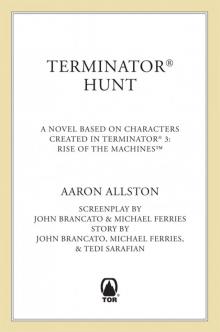 Terminator 3--Terminator Hunt
Terminator 3--Terminator Hunt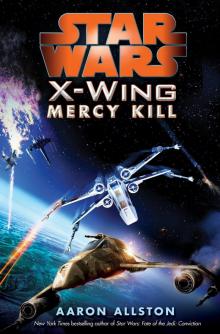 Mercy Kil
Mercy Kil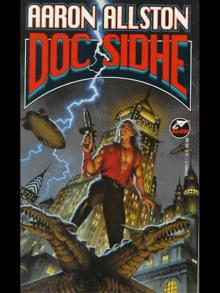 Doc Sidhe
Doc Sidhe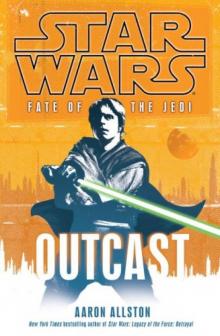 Star Wars: Fate of the Jedi: Outcast
Star Wars: Fate of the Jedi: Outcast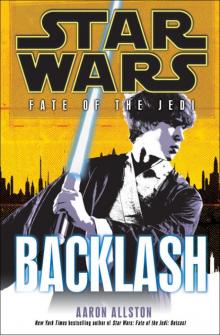 Fate of the Jedi: Backlash
Fate of the Jedi: Backlash Mercy Kill
Mercy Kill Rebel Stand
Rebel Stand Wraith Squadron
Wraith Squadron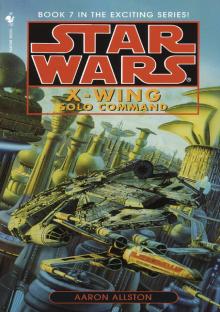 Star Wars: X-Wing VII: Solo Command
Star Wars: X-Wing VII: Solo Command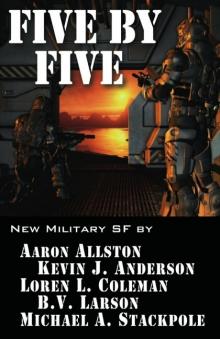 Five by Five
Five by Five Solo Command
Solo Command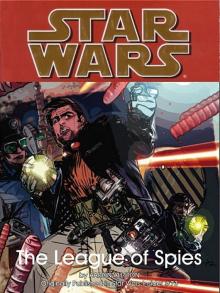 Star Wars: The Clone Wars Short Stories: The League of Spies
Star Wars: The Clone Wars Short Stories: The League of Spies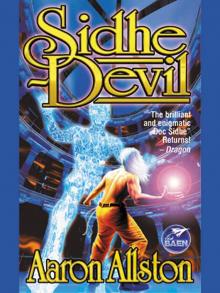 Sidhe-Devil
Sidhe-Devil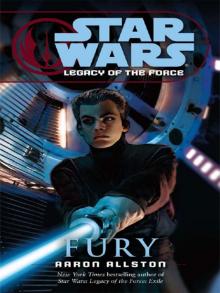 Star Wars: Legacy of the Force: Fury
Star Wars: Legacy of the Force: Fury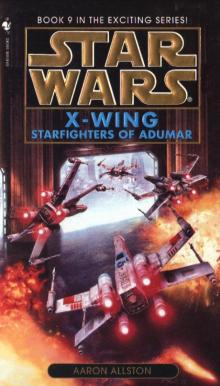 Starfighters of Adumar
Starfighters of Adumar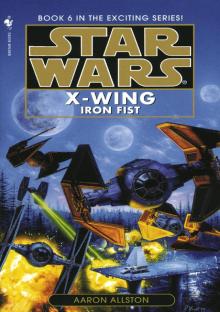 Star Wars: X-Wing VI: Iron Fist
Star Wars: X-Wing VI: Iron Fist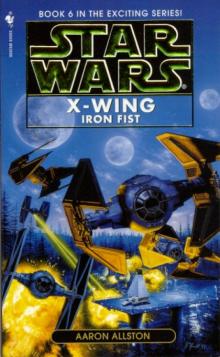 Star Wars - X-Wing - Iron Fist
Star Wars - X-Wing - Iron Fist Exile
Exile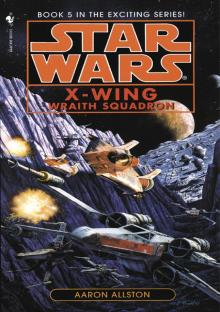 Star Wars: X-Wing V: Wraith Squadron
Star Wars: X-Wing V: Wraith Squadron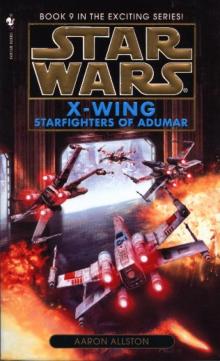 Star Wars - X-Wing - Starfighters of Adumar
Star Wars - X-Wing - Starfighters of Adumar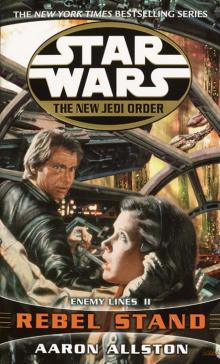 Rebel Stand: Enemy Lines II
Rebel Stand: Enemy Lines II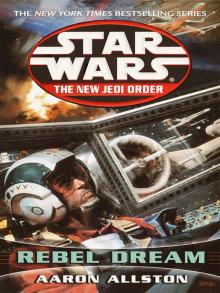 Rebel Dream: Enemy Lines I
Rebel Dream: Enemy Lines I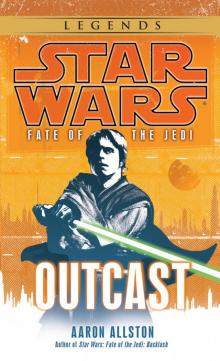 Outcast
Outcast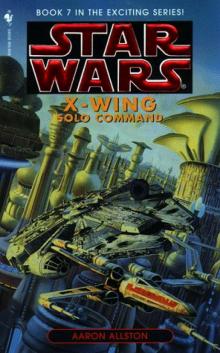 Star Wars - X-Wing 07 - Solo Command
Star Wars - X-Wing 07 - Solo Command